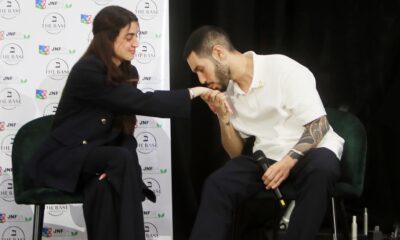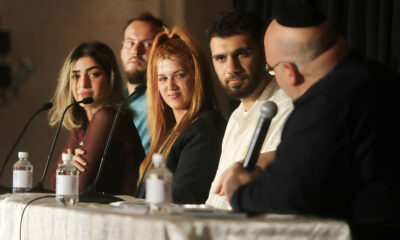
News

Former SA hostage tormented by husband’s captivity
Freed hostage Aviva Siegel has chosen not to watch the Hamas propaganda video of her beloved husband, Keith, whom she was forced to leave behind in Gaza after enduring 51 days of hell in Hamas captivity.
“My heart won’t handle it. It will break me up in pieces,” she told the SA Jewish Report this week.
The toll is evident on the South African-born nursery school teacher as she describes the unbearable pain of possibly seeing her husband’s suffering reflected in his kind eyes, a torment she knows all too well having endured the same captivity.
After months without any word from Keith or any of the hostages, Aviva, 63, received the first sign of life during Pesach. Hamas published an undated video on Saturday, 27 April, showing Keith, an American and Israeli citizen, along with another Israeli hostage, Omri Miran.
“I want to tell my family that I love you very much,” Keith, who turns 65 this week, says in the video. “It’s important to me that you know I’m OK, and I really hope you are too.”
During the video, he breaks down, and struggles to continue.
Both he and Miran mention the Passover holiday, suggesting the video was recorded recently. Miran says he has been held for 202 days.
It has been 216 days, at the time of going to print, since the start of the war, when the Siegels were abducted from their home in Kfar Aza, a kibbutz community near the Gaza border, and driven in their car at gunpoint into Gaza. Hamas terrorists killed 62 people from their kibbutz and took 19 people hostage. Keith was shot in the hand and suffered broken ribs. The couple remained together in captivity until they were separated when Aviva was released during a brief ceasefire and hostage exchange deal in November.
Aviva never imagined that nearly five months after she said goodbye to her husband in Gaza, he would still be held captive.
Although the video has brought renewed hope, Aviva said she couldn’t bring herself to watch it. “It’s too much for me to see him in such pain. To look into his eyes, I’ll know what he feels.”
Only one of the couple’s four children has summoned the courage to view the video.
“I know people tell me that he did it for me, for us, but we just can’t. It’s unbearably hard,” she said. Aviva, who was born in South Africa and grew up in Randfontein, said each day was a torment.
“My whole body hurts. We’re going through hell,” she said. One day, she wakes up feeling hopeful and imagines being reunited with her husband, described by his brother, Lee, as a sensitive, kind family man.
Her daughters, however, caution her not to get her hopes up. This after months of back-and-forth negotiations culminating in fruitless outcomes. The next day, she’s gutted “the whole day”, as hopes of the hostages’ release dim yet again as negotiators reach another impasse. The cycle of hope and despair repeats endlessly. This week brought yet another round of perplexing news, with headlines flip-flopping between a truce deal being on and then off again, and Israel’s ground offensive in Rafah.
“I want to stand on the highest mountain and scream,” said Aviva. “Even if I do this, no-one will listen.”
Aviva has become one of Israel’s most vocal advocates for hostage families, appealing to Israeli legislators, world leaders, and international mediators to do more to secure their release.
She has spoken out about her captivity, testified before the Knesset on the sexual violence perpetrated by Hamas on female hostages, travelled to numerous countries including Geneva, where she addressed the Red Cross and the United Nations, and has met United States President Joe Biden and Secretary of State Antony Blinken.
“I told Keith I would be strong for him and would do everything I could to bring him home,” she said.
“I know the conditions they are living under. It’s too terrible. Every day that goes by puts them more at risk.”
Since the start of the war, 124 hostages have been freed, 105 of whom, including Aviva, were released in late November. As part of the truce, Israel released 240 Palestinian prisoners and detainees. Israel believes Hamas still holds 133 people captive in Gaza, including the bodies of 33 people. It’s unclear how many others are still alive.
On Monday, 6 May, the family met legislators again at the Knesset to plead with them to do everything possible to secure the hostages’ release.
“They knew we were coming, and hadn’t bothered to watch the video. My daughter was furious. All they spoke about was war and politics. I cried and pleaded, and told them all I witnessed in Gaza, about the cruel conditions,” she said.
“I’ve been a kindergarten teacher my whole life, and all I see and hear is men acting like four-year-olds.”
For Aviva and many of the hostages’ families, the focus is on getting them out of Gaza now. They continue to advocate for Israel to do whatever it takes, including ceasing hostilities, to secure their release.
Aviva has been staying with her daughter, Elan Tiv, 33, on Kibbutz Gazit in northern Israel since her release. She has no intention of returning to Kfar Aza.
It’s a close-knit family. Lee and his wife, Sheli, also from South Africa, have joined the fight.
Sheli said they had no idea there was going to be a video. They found out as they were on the way to Hostages Square for havdalah, a ritual since the start of the war.
“People started calling us to say that Keith was on Channel 13. We stopped on the highway, did a U-turn, and went home to watch. It was traumatic. Lee felt enormous relief that his brother was alive. But he remains worried as the hostages’ lives are in peril,” said Sheli.











Gary
May 9, 2024 at 5:03 pm
No quarter for Gaza until our hostages are brought back home, each and every one!